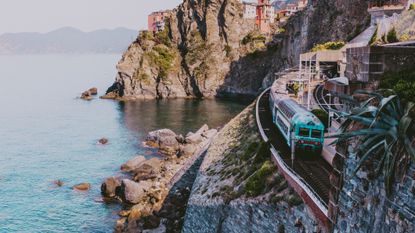

When I’m stuck on a plane or train, I typically turn to bad movies or good podcasts to pass the hours until I get to my destination. But occasionally, deadlines force me to work on-the-go, and I’m always astounded by how productive I can be. There’s nowhere to go and nothing else to do, so, armed with a laptop, fast wifi, and a tray in the seat in front of me, I buckle up—and buckle down.
This summer, I doubled down on the hunch that I could get a ton done from a mobile office by planning a trip in the middle of my book deadlines, a period when I had a super specific (and huge) deadline looming: I’m a fiction writer, and the synopsis and 30-page sample (that’s 10,000 words) for my third book proposal were due to my editor the very week I returned. To keep up, I’d have to average several pages per day while staying on top of emails and revisions for my other gig as a freelance writer.
For just over two weeks, I zipped around Europe with a Eurail Pass, traveling by day so that I could work from the rails and enjoy new cities at night. And I’m here to tell you that squishing your working hours into your transportation time and freeing your evenings and weekends for exploring new places means you can freaking Have It All—excelling at your job and exploring somewhere new, even if your own stash of vacation days is limited.
But it takes a little more planning than just snatching up your laptop and running for the hills. Whether you’re also dreaming of romantic train rides in another continent or you’re taking the Bolt Bus closer to home, here’s everything you need to know to make that whole work-from-the-road fantasy happen this holiday season or in the year ahead.
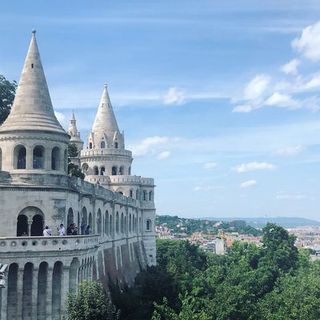
Get the All-Clear on Working From "Home"
Even if your company already has a WFH policy, you’ll still need to get your boss’s sign-off on this plan to ensure she knows you won’t be coming into the office for a stretch (especially if you’ll be in a different time zone, which might mean answering emails or turning in projects at different times than the rest of your team).
If your company doesn’t let employees telecommute, consider it #selfcare (the hard-but-necessary kind, not the bubble-bath variety) to campaign for this perk. Set up a meeting with your boss and come armed with data showing remote workers are more productive than their cubicle-bound counterparts (so no, you won’t just be goofing off in lieu of working), less likely to quit (and doesn’t your company want to keep its best employees?), and less expensive for the company.
Today, 40 percent more employers offer flexible workplace options than they did five years ago, according to a survey from Global Workplace Analytics, and a manager might be extra-amenable to you phoning it in (literally, not metaphorically) in August or around the holidays when business is slow, anyway. Why be stuck at your desk (or using up a precious PTO day) when you could accomplish more and visit some incredible places?
Stay In The Know
Marie Claire email subscribers get intel on fashion and beauty trends, hot-off-the-press celebrity news, and more. Sign up here.
Iron Out Your Itinerary
I mapped out a trip with two nights in every city, hopscotching across Eastern Europe and working my way west. That meant I basically alternated work days with sightseeing days, since every other day I was on a train somewhere new. Since I’m a full-time writer (my debut thriller, The Lost Night, was named a Best Book of the Year by Marie Claire and is being turned into a TV series by Mila Kunis), so I didn’t need a boss to approve my schedule. But my book editor functions like a manager, setting deadlines and signing off on every stage of my work. With the book three deadline looming, I knew I’d have to be disciplined.

The Eurail pass was a great option for me, since I could use it to make reservations (and even hop on some trains reservation-free) all across the continent. You can pre-purchase a Eurail pass for either a set number of travel days over a specific block of time, or unlimited travel over a period. Eurail’s partners (Trenitalia, Eurostar, France’s SNCF, and more) honor your Eurail pass as if it were a train ticket you’d bought from their counter. It’s sort of like buying one of those ski lift passes that works at a ton of different resorts—with it, you don’t need to keep buying individual tickets within every country’s transit system. The company has a number of plans at different price points; I went for the 15-day unlimited pass, which meant I could pay once ($669) and then hop on a different train every single day, if I wanted.
Most of my travel days had between two and five hours actually in transit, but I figured I could pack a lot of work into that chunk. (While the average American spends eight hours a day plopped in their office chair, they only do two hours and 23 minutes of actual work.)
I mostly chose early-morning trains so I could get my writing out of the way and then enjoy the new cities, and my god, was that a bad idea. See, I’m not a morning person. Maybe you are: Thirty-five percent of people say their most productive times are before regular business hours, and 38 percent say they’re at their best between 9 and 11 a.m., but I don’t hit my stride until almost lunchtime. Add in the time difference (I visited Austria, Hungary, Croatia, Slovenia, Italy, and Switzerland—all six hours ahead), and I was a zombie as my trains rolled past beautiful farmland and mountains.
Plus, whenever I got off the train and shuffled, zombie-like, to my hotel, the room wouldn’t be ready yet (duh). Luckily, I managed to hit my word-count goals shortly after arriving by taking advantage of the inns’ lovely lounges; at Splendid Venice, for example, I sipped coffee and wrote two chapters while sitting on a plush loveseat overlooking a canal, gondolas floating by.
The upshot? Be smarter than me and plan your transportation for when you’ll actually feel like working—and have a backup plan covering when and how you’ll wrap up if you arrive with your to-do list not quite completed.
Gather Your Gear
I take my MacBook Air pretty much everywhere, but I have friends who pack even lighter and only carry a tablet and a bluetooth keyboard. Either way, you’ll want good wi-fi whenever you’re on the clock, and you can’t always trust the train (or discount bus line or airline) to provide it. I carried around a mobile hotspot from Tep Wireless, which worked incredibly well. I ordered the palm-sized gizmo before I left (after ensuring it would work in all six countries I visited), then set up an account to load wi-fi time onto it. For $10 a day, I could create my own wifi network wherever I was—so I’d keep my phone in airplane mode (no roaming for me, thanks) then just turn on the wifi reception, and boom, I was back on the grid. (Since I didn’t have an international calling or texting plan, I sent texts from Whatsapp and made calls from Skype.)
I could connect my iPhone and laptop and surf at speeds that felt about the same as my home wifi. I also kept it in my bag when I was out exploring, turning it on when I needed to look something up on my phone. This was incredibly useful when I was, say, figuring out the tram system in Zagreb, Croatia, sussing out the best štruklji (that’s a super-dense stuffed pasty) in Ljubljana, Slovenia, and uploading Instagram stories from a mountaintop at Gurtenfestival outside Bern, Switzerland (those Swiss folks can dance).
I didn’t bring a portable powerbank for my laptop, but I wish I had, as some of the trains didn’t have outlets. (On the other hand, racing to finish a scene before my battery died meant I had some of my fastest drafting days ever.)
Get a Window Seat
Even when I was staring out of a train’s window at fields and towns rolling past (and not, you know, working like I said I would), something awesome was happening: I kept having new ideas and insights for my new book. Other ideas bubbled up, too: cool events I could host for The Lost Night, clever ways we could market my second thriller, The Herd. It was as if being somewhere new had thrown my brain off its regular track (train metaphor alert!) and onto a whole new one. Feeling inspired and inventive is excellent for fiction writers like me—and likely for you, and for every other employed human, because what job doesn’t require you to solve problems and think about things in a new light?
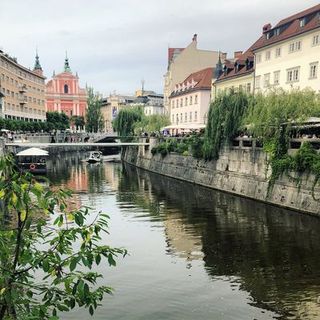
The research backs up my hunch that travel is the mother of invention. In one study, hiking (while taking a digital detox) led to a 50 percent jump in creativity. Research from Indiana University showed that even the suggestion of distance boosted creative thinking: Participants who were told the brain-teasers in front of them were created in California, rather than their home state, came up with more out-of-the-box solutions and were ultimately more likely to solve the puzzles. And working abroad provides benefits even far-flung vacations can’t; a study of creative directors in the fashion industry found a positive link between creative output and the years of their career they spent overseas.
As I put the finishing touches on my book proposal in Bern, breathing in the crisp Alpine air and gazing out at rows of adorable, historic buildings and mountains jutting up in the distance, I vowed to pack up my home office and work on the move more often. I love restful vacations as much as the next girl, but I must also make a case for blending up that work/life balance: You could save on precious PTO days and grow more inspired, creative, and productive along the journey.
For more stories like this, including celebrity news, beauty and fashion advice, savvy political commentary, and fascinating features, sign up for the Marie Claire newsletter.
RELATED STORY

Andrea is a Brooklyn-based wordsmith and author of WE WERE NEVER HERE, THE HERD, and THE LOST NIGHT.
-
 The 2024 Met Gala Is Almost Here—Here's How and When to Stream It Live
The 2024 Met Gala Is Almost Here—Here's How and When to Stream It LiveArmchair fashion critics, it's our time.
By Quinci LeGardye Published
-
 Why Youthforia's New Foundation Is Under Fire
Why Youthforia's New Foundation Is Under FireThis isn't the way to do inclusive shades.
By Halie LeSavage Published
-
 Dutch Princess Says She Found “Freedom” In Spain After Threats Forced Her to Move
Dutch Princess Says She Found “Freedom” In Spain After Threats Forced Her to Move“A touching demonstration of friendship at a difficult time,” her father, King Willem-Alexander, said.
By Danielle Campoamor Published
-
 The 10 Best Health Spa Resorts in the U.S.
The 10 Best Health Spa Resorts in the U.S.It’s pampering time.
By Michelle Stansbury Published
-
 The Fashion Editor’s Guide to Saint-Germain-des-Prés
The Fashion Editor’s Guide to Saint-Germain-des-PrésThe most stylish things to see and do in the creative hub of Paris, the 6th arrondissement.
By Sara Holzman Published
-
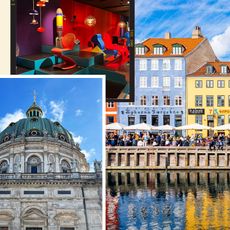 The Ultimate Guide to Copenhagen
The Ultimate Guide to CopenhagenExplore one of the happiest cities in the world.
By Emma Childs Published
-
 The Ultimate Guide to Paris
The Ultimate Guide to ParisWhere to stay and what to do in the City of Lights.
By Sara Holzman Published
-
 The 17 Best Luggage Sets of 2023
The 17 Best Luggage Sets of 2023BRB, setting my "out of office" message.
By Emma Childs Published
-
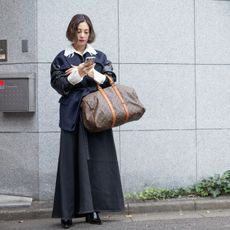 The 11 Best Weekender Bags for Women, According to Editors and Experts
The 11 Best Weekender Bags for Women, According to Editors and ExpertsIn case you needed another reason to be pumped about your trip.
By Julia Marzovilla Last updated
-
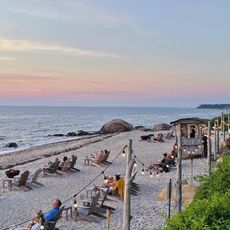 Weekend Guide to the North Fork: Where To Stay, Eat, & Drink
Weekend Guide to the North Fork: Where To Stay, Eat, & DrinkWine, oysters, and more wine please.
By Sara Holzman Last updated
-
 Romantic Weekend Getaways For Every Kind of Couple
Romantic Weekend Getaways For Every Kind of CoupleFind love in all the right places.
By Sara Holzman Last updated